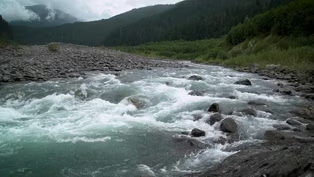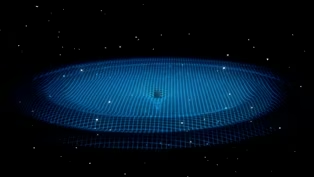Oregon Field Guide
Frog Taxi
Clip: Season 36 Episode 3 | 8m 16sVideo has Closed Captions
Red-legged frogs cross a busy Portland highway with help from the “Frog Taxi.”
The resident reg-legged frogs that live in Portland’s Forest Park have a dangerous migration route to and from their spawning grounds at Harborton Wetland. Twice a year, they must get across the high-speed road known as Highway 30. For many years, the frogs’ human neighbors have intervened on their behalf by providing a shuttle or "taxi" to the other side. But is there a better solution?
Problems playing video? | Closed Captioning Feedback
Problems playing video? | Closed Captioning Feedback
Oregon Field Guide is a local public television program presented by OPB
Oregon Field Guide
Frog Taxi
Clip: Season 36 Episode 3 | 8m 16sVideo has Closed Captions
The resident reg-legged frogs that live in Portland’s Forest Park have a dangerous migration route to and from their spawning grounds at Harborton Wetland. Twice a year, they must get across the high-speed road known as Highway 30. For many years, the frogs’ human neighbors have intervened on their behalf by providing a shuttle or "taxi" to the other side. But is there a better solution?
Problems playing video? | Closed Captioning Feedback
How to Watch Oregon Field Guide
Oregon Field Guide is available to stream on pbs.org and the free PBS App, available on iPhone, Apple TV, Android TV, Android smartphones, Amazon Fire TV, Amazon Fire Tablet, Roku, Samsung Smart TV, and Vizio.
Providing Support for PBS.org
Learn Moreabout PBS online sponsorship(traffic droning) - [VO] A rainy night in Northwest Portland might not be everyone's idea of a good time, but it does attract frogs.
- [Speaker] You're going to need a spokesperson for your species.
- [VO] And the people who care about them.
(frogs croaking) These are Northern red-legged frogs and these local natives are getting a little harder to find these days.
- [Colin] It is a Oregon species of concern, because populations are in decline and probably the main reason is habitat loss.
(frogs croaking) - [VO] Colin MacLaren is a wetland ecologist with Portland General Electric.
Near this PGE substation north of Linnton, red-legged frogs are neighbors, - So, they spend their adult life up in Forest Park, which is just to the south of us.
And around December or so they start to migrate down to breed.
- [VO] This wetland is known as Harborton, and it's the site of one of PGE's long-term restoration projects.
- [VO] It's a 53-acre habitat preserve that's within seven, eight miles of downtown Portland, and it's one of the more significant breeding sites in the region.
- [VO] Frogs lay their eggs in these gelatinous masses.
The eggs incubate for a few weeks in the wetland, while mom and dad head back up hill to Forest Park, (frogs croaking) and that migration part is where things can get well deadly.
- So, the biggest impediment to the frogs coming to this site is Highway 30, which is a busy roadway.
- [VO] Enter the dedicated volunteers of the Harborton Frog Shuttle, also known as the Frog Taxi.
(car beeping) Philip Fensterer is one of its volunteer leaders.
- I am the Sunday night frog captain, frog taxi captain, and this is the frog log.
So, that's where we store all of our frog data.
- [VO] The frog log records how many frogs came downhill to breed in early winter.
- [Philip] For the season we're 155 females and 1,400 males.
- [VO] And now in early March, it's time to get those breeders back uphill to Forest Park for the summer.
- We are here to make sure they get across Highway 30 safely, otherwise it becomes real-life frogger.
(upbeat gaming music) - [VO] But to keep the frogs from becoming video game victims, Philip and his team will have to catch the frogs.
- It's a frog fence.
It slows them down, 'cause it's really surprising how fast they move.
So, we'll have several volunteers and myself watching for the frogs coming out of the wetlands and we'll be intercepting them.
Almost there.
There we go.
Hey, welcome back.
Good to see you.
- [Volunteer] Good to see you too.
- [VO] Just before nightfall, volunteers begin to show up.
- We had an amazing night on the 25th.
Kameron was with me and we were out here until 11 o'clock at night.
- It was insane.
There were frogs everywhere.
- Our temperature right now is 47.4, so that's a good temperature for frogs.
It's raining, so they like that too.
So, we've got pretty good frog conditions tonight.
All right, you all, we can get started.
- [VO] Frog spotting can be tricky.
- For the most part, you're just trying to see for anything that stands out or looks back at ya.
- [VO] While cold and wet are ideal conditions for frogs,- - No luck.
- Not yet.
- [VO] this evening seems to be getting off to a slow start.
- This is almost too comfortable.
- [VO] But the slow start hasn't dampen Sierra Lafever's enthusiasm.
- I love frogs.
I found out about this, I emailed.
I was like, "I know you guys are full up.
Is there any way I can get in on this?"
And they had an opening, so I've been out here five times.
I love it.
I could be out here all night.
- [VO] While we're waiting for something to happen, it might be a good time for a bit of history.
(revealing harp music) One rainy night in 2013, some local folks were heading down Harborton Drive and noticed a bunch of frogs hopping across the road.
- [Philip] And the next day, is when they saw a lot of road kill and that's when it really kicked in that we needed to start doing something.
- [VO] And the frog taxi was born.
- Oh yeah, we got one.
- [VO] The party finally gets jumping when Kameron finds the first frog.
- This is our target species, the red-legged frog, and it was headed across the road.
- So, we saved this little guy's life.
- Yeah, absolutely.
- Every night is different.
It's sort of the luck of the draw as far as the conditions being right, but I am optimistic.
(frogs croaking) - Oh, there's one right there.
(frogs croaking) Here we go, little guy.
That's three.
- [Philip] There's two right here.
He's pretty squirmy.
Oh, there he goes.
It was on the fence.
The fence is doing its job.
- [OS] Oh, there's a tiny one.
- [Jane] Yeah, that's a chorus frog.
- [VO] A couple hours after sundown and seven frogs captured.
- [Philip] Five and two?
- [Jane] Five and two.
- [VO] The taxi is on its way, albeit cautiously.
- I'm kind of creeping along.
When you see a road kill, it kind of crushes you.
Chorus frog in the road right there.
That's not going to happen on my watch.
- [VO] In a few minutes, Philip and his precious cargo are across the highway and headed uphill to Forest Park.
The commute is just a few hundred yards, but this taxi ride makes all the difference.
- We're going to walk up the hill just a little bit.
I have a spot where there's some nice sword fern for them to start out in and they can spread from there.
- [VO] With the tip of a bucket,- - [Philip] Here we go.
- [VO] and some words of advice,- - [Philip] Make good choices.
- [VO] the frogs are on their way home.
But on the way back down, volunteer Alex Terlecky find some females still trying to get downhill to the wetland.
- [Alex] These are some of the late season stragglers it seems like.
- [VO] The females are slightly rounder than the males, because they carry the eggs.
- And so pretty good night tonight having three females come down the hills.
I was surprised.
- [Philip] All right, thank you for being out here.
- [VO] Once the downhill frogs are loaded, the taxi heads back to the wetland.
- And so it's a little bit of a back and forth.
It's a shuttle, it's a frog taxi, it's a Fruber, as in Frog Uber.
- [VO] If this seems like kind of a lot of effort.
Well, it is.
- [Philip] We put thousands of volunteer hours in every winter, and oh, I don't know how sustainable that is.
- [VO] The Oregon Wildlife Foundation is leading an effort to build the frogs an underpass, but building a tunnel under a highway is expensive.
And since this isn't an animal that's going to damage your car, if it gets out in front of you, it's a less compelling financial priority.
- [Philip] Ready to go get in the water.
Go that way.
- [VO] So, until these obstacles are tackled, the resident frogs of Northern Forest Park can hop on the frog taxi.
- If I can save a frog and the team can save frogs, we're going to do the best we can.
(no audio) - Getting inspiration for your next adventure is kind of why you're here, right?
Well, you can support more of what we do on "Oregon Field Guide" and everything else you see on OPB, like going to opb.org/video and becoming a sustaining member.
Elwha River rebounds after dam removal
Video has Closed Captions
Clip: S36 Ep3 | 9m 58s | Witness the Elwha River’s recovery 12 years after dam removal. (9m 58s)
Video has Closed Captions
Clip: S36 Ep3 | 9m 30s | Scientists search for colliding black holes from the windy steppe of eastern Washington. (9m 30s)
Providing Support for PBS.org
Learn Moreabout PBS online sponsorshipSupport for PBS provided by:
Oregon Field Guide is a local public television program presented by OPB

















